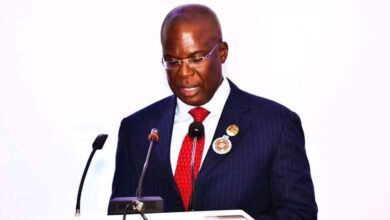Nigeria Fuel Subsidy Removal: A Bold Move by President Bola Ahmad Tinubu
Many Nigerians are asking why Federal Govnment Remove Fuel Subsidy?

Nigeria Fuel Subsidy Removal: A Bold Move by President Bola Ahmad Tinubu
why fuel subsidy removal?
Introduction: In a decisive and visionary move, President Bola Ahmad Tinubu has made the bold decision to remove fuel subsidies in Nigeria. This action marks a significant turning point in the country’s economic and political landscape. In this post, we will explore the reasons behind this decision, its potential impacts, and the long-term benefits it may bring to Nigeria.
- Understanding Fuel Subsidies: Fuel subsidies are government initiatives aimed at reducing the cost of fuel for consumers. In Nigeria, the fuel subsidy program has been in place for decades, intended to alleviate the financial burden on citizens and stabilize the economy. However, these subsidies have proven to be a double-edged sword, leading to several unintended consequences.
- The Rationale Behind Removal: President Tinubu’s decision to remove fuel subsidies stems from a comprehensive understanding of their negative impact on the Nigerian economy. The subsidies have placed a significant strain on the country’s finances, diverting valuable resources from essential sectors such as healthcare, education, and infrastructure development. By eliminating subsidies, President Tinubu aims to redirect these funds towards more productive and sustainable areas of growth.
- Benefits of Subsidy Removal: a) Economic Stability: With the removal of fuel subsidies, Nigeria can reduce its budget deficit and alleviate pressure on public finances. This move will enable the government to reallocate funds towards crucial sectors, fostering economic stability and growth. b) Foreign Investment: The elimination of subsidies signals a commitment to fiscal responsibility, which can enhance investor confidence in Nigeria. Increased foreign investment can spur economic development, create job opportunities, and contribute to long-term prosperity. c) Diversification: The subsidy removal can act as a catalyst for diversifying Nigeria’s economy. By reallocating resources to strategic sectors such as agriculture, manufacturing, and renewable energy, the country can reduce its heavy reliance on oil exports and build a more resilient and sustainable economy.
- Mitigating the Impact: President Tinubu’s administration recognizes the potential short-term challenges associated with fuel subsidy removal. To mitigate the impact on vulnerable segments of society, the government plans to implement social safety nets and targeted assistance programs. These measures will ensure that those most affected by the subsidy removal receive adequate support during the transition.
- Citizen Empowerment: The removal of fuel subsidies creates an opportunity for citizens to actively participate in Nigeria’s economic growth. As the government redirects funds towards critical sectors, it can invest in initiatives that promote entrepreneurship, job creation, and skills development. This empowerment will foster a sense of ownership and engagement among the population, leading to a more inclusive and prosperous society.
President Bola Ahmad Tinubu’s decision to remove fuel subsidies in Nigeria is a courageous step towards economic reform and progress. While there may be short-term challenges, the long-term benefits far outweigh the temporary inconveniences. By redirecting funds to vital sectors and fostering economic stability, Nigeria can position itself as a vibrant and diversified economy, attracting foreign investment and securing a brighter future for its citizens.
Fuel subsidies in Nigeria have been implemented for several decades with the primary objective of reducing the cost of fuel for consumers. The intention behind these subsidies was to alleviate the financial burden on citizens and stabilize the country’s economy. However, over time, it has become evident that these subsidies have had unintended consequences and are a double-edged sword for the Nigerian economy.
One of the main drawbacks of fuel subsidies is their significant strain on the country’s finances. The funds allocated to subsidizing fuel could be otherwise utilized for essential sectors such as healthcare, education, and infrastructure development. As a result, the government has had to divert a substantial portion of its budget towards maintaining the subsidies, limiting its ability to invest in critical areas that can drive long-term economic growth.
Another consequence of fuel subsidies is the distortion of market forces. By artificially lowering fuel prices, subsidies can create an imbalance between supply and demand. This can lead to inefficient consumption patterns, overconsumption of fuel, and even fuel smuggling across borders. These distortions can further strain the economy and hinder its overall development.
Moreover, fuel subsidies often benefit the wealthy more than the poor. Since fuel consumption is not directly linked to income levels, the subsidies tend to benefit higher-income individuals who consume more fuel. This results in a regressive distribution of benefits, where the wealthy receive a larger share of the subsidies compared to low-income individuals who may not own vehicles or consume as much fuel.
Additionally, fuel subsidies can discourage investments in alternative energy sources and hinder efforts to transition to a more sustainable and environmentally friendly energy sector. The availability of cheap fuel through subsidies can undermine the incentive for individuals and businesses to adopt cleaner and renewable energy solutions, contributing to the country’s carbon emissions and environmental challenges.
In summary, while the intention behind fuel subsidies in Nigeria was noble, the unintended consequences associated with them have become apparent over time. The strain on public finances, market distortions, regressive distribution of benefits, and hindrance to sustainable energy solutions all underscore the need for a reassessment of the subsidy program. President Bola Ahmad Tinubu’s decision to remove fuel subsidies represents a bold move towards addressing these challenges and fostering a more economically stable and sustainable future for Nigeria.
President Tinubu’s decision to remove fuel subsidies in Nigeria is rooted in a deep understanding of the negative impact they have on the country’s economy. The subsidies have placed a substantial strain on Nigeria’s finances, resulting in the diversion of valuable resources from critical sectors such as healthcare, education, and infrastructure development. By eliminating these subsidies, President Tinubu seeks to redirect the funds towards more productive and sustainable areas of growth.
One of the primary reasons for removing fuel subsidies is to alleviate the financial burden they impose on the government. These subsidies have been a significant drain on public finances, consuming a substantial portion of the national budget. By removing them, President Tinubu aims to free up resources that can be used more effectively to address pressing needs in sectors like healthcare, education, and infrastructure. This shift in spending priorities can lead to improved public services, enhanced social welfare, and increased investment in critical infrastructure projects that drive economic growth.
Additionally, the removal of fuel subsidies can promote fiscal discipline and responsible governance. The subsidies have long been criticized for their inefficiency, susceptibility to corruption, and the misallocation of funds. By eliminating them, President Tinubu aims to establish a more transparent and accountable system, ensuring that public resources are used effectively and for the benefit of all Nigerians. This move can enhance public trust in the government and its ability to manage the country’s finances responsibly.
Furthermore, by redirecting the funds from fuel subsidies, President Tinubu aims to stimulate economic growth and diversification. Nigeria’s heavy dependence on oil exports has made its economy vulnerable to fluctuations in global oil prices. Removing fuel subsidies can help reduce this vulnerability by reallocating resources to sectors with high growth potential, such as agriculture, manufacturing, and renewable energy. This strategic shift can foster economic diversification, create employment opportunities, attract foreign investment, and ultimately lead to a more resilient and sustainable economy.
In conclusion, President Tinubu’s decision to remove fuel subsidies is driven by a comprehensive understanding of their negative impact on the Nigerian economy. By freeing up resources currently allocated to subsidies, the government can redirect funds to essential sectors, promote fiscal discipline, and stimulate economic growth and diversification. This move represents a strategic step towards building a more sustainable and prosperous future for Nigeria and its citizens.
a) Economic Stability: The removal of fuel subsidies can contribute to economic stability in Nigeria. These subsidies have placed a significant strain on the country’s budget deficit, as they require a substantial amount of government expenditure. By eliminating the subsidies, Nigeria can reduce its budget deficit and ease the pressure on public finances. The freed-up resources can then be reallocated to crucial sectors such as healthcare, education, and infrastructure development. This reallocation of funds can contribute to economic stability by improving public services, enhancing human capital, and promoting long-term sustainable growth.
b) Foreign Investment: The elimination of fuel subsidies demonstrates a commitment to fiscal responsibility and prudent economic management. This commitment can significantly enhance investor confidence in Nigeria. Foreign investors are attracted to countries with stable and well-managed economies. By removing subsidies, President Tinubu’s administration sends a strong signal that Nigeria is taking steps towards a more sustainable economic model. This can instill trust in foreign investors, encouraging them to invest in the country. Increased foreign investment can stimulate economic development, create job opportunities, and contribute to long-term prosperity. It can also bring in new technologies, expertise, and market access, further boosting Nigeria’s economic growth potential.
Moreover, the removal of subsidies can create a level playing field for businesses in Nigeria. Subsidies often benefit specific industries or players, distorting market dynamics and hindering fair competition. By eliminating these subsidies, the government promotes a more equitable business environment, where companies can compete based on their merits and efficiency. This can attract both domestic and foreign investment, as businesses thrive in an environment where market forces operate freely.
, the removal of fuel subsidies in Nigeria offers several benefits, including economic stability and increased foreign investment. By reducing the budget deficit and reallocating funds to essential sectors, Nigeria can foster economic stability and promote sustainable growth. Additionally, the commitment to fiscal responsibility can enhance investor confidence, attracting foreign investment that can contribute to long-term prosperity. By creating a level playing field for businesses, subsidy removal can further stimulate economic development and promote fair competition.
President Tinubu’s administration is well aware of the potential short-term challenges that may arise from the removal of fuel subsidies. To address these challenges and mitigate the impact on vulnerable segments of society, the government has planned various measures. These measures aim to provide support and assistance to those most affected by the subsidy removal during the transition period. Here are some key strategies that the government may employ:
- Social Safety Nets: The government can establish or strengthen existing social safety net programs to provide immediate relief to vulnerable individuals and households. These safety nets can include cash transfer programs, food subsidies, or targeted welfare schemes. By ensuring that basic needs are met, the government can mitigate the initial shock of subsidy removal and provide temporary assistance until individuals and households adjust to the new pricing regime.
- Targeted Assistance Programs: The government can design and implement targeted assistance programs specifically tailored to mitigate the impact on specific groups or sectors that may be disproportionately affected by the subsidy removal. For example, programs can be developed to support low-income individuals, small-scale businesses, or rural communities heavily reliant on fuel for transportation or energy. These programs can include financial support, capacity building initiatives, or alternative livelihood programs to help affected individuals and communities adapt to the new circumstances.
- Public Awareness Campaigns: The government can launch comprehensive public awareness campaigns to educate the population about the reasons behind the subsidy removal and the long-term benefits it can bring. Clear communication can help alleviate concerns, build trust, and ensure that individuals understand the government’s commitment to providing support during the transition. These campaigns can also educate citizens on energy conservation, alternative energy options, and responsible consumption practices, empowering them to make informed choices and adapt to the new pricing structure.
- Consultation and Dialogue: Engaging with stakeholders, including civil society organizations, industry representatives, and consumer associations, can provide valuable insights and ensure that the measures implemented effectively address the needs of the affected groups. By fostering open dialogue and consultation, the government can identify potential challenges, gather feedback, and refine its assistance programs accordingly.
- Monitoring and Evaluation: It is crucial for the government to establish a robust monitoring and evaluation framework to assess the impact of subsidy removal and the effectiveness of the mitigation measures. Regular monitoring can help identify any unintended consequences and enable timely adjustments to the assistance programs as needed. This ensures that the government’s efforts are responsive, efficient, and address the evolving needs of the affected population.
President Tinubu’s administration is committed to implementing measures to mitigate the impact of fuel subsidy removal on vulnerable segments of society. By implementing social safety nets, targeted assistance programs, public awareness campaigns, engaging in consultation, and establishing monitoring and evaluation mechanisms, the government aims to provide support during the transition and ensure that those most affected receive adequate assistance. These strategies will help minimize short-term challenges and facilitate a smoother adaptation to the new pricing regime.
The removal of fuel subsidies in Nigeria not only addresses economic challenges but also presents an opportunity for citizen empowerment and active participation in the country’s economic growth. As the government redirects funds previously allocated to subsidies towards critical sectors, it can invest in initiatives that promote entrepreneurship, job creation, and skills development. This empowerment of citizens fosters a sense of ownership and engagement, leading to a more inclusive and prosperous society. Here are some key aspects of citizen empowerment resulting from subsidy removal:
- Entrepreneurship and Business Development: With redirected funds, the government can invest in programs that support entrepreneurship and business development. This can include providing financial assistance, access to credit, business incubation services, and training programs. By encouraging citizens to start and grow their own businesses, the government creates opportunities for job creation, innovation, and economic diversification. Empowered entrepreneurs can contribute to the country’s overall economic growth and become agents of change within their communities.
- Job Opportunities: By investing in critical sectors such as healthcare, education, and infrastructure, the removal of subsidies can lead to the creation of new job opportunities. As resources are reallocated to these sectors, there will be a need for skilled professionals, teachers, healthcare workers, construction workers, and other professionals. This not only reduces unemployment rates but also enhances the overall standard of living and economic well-being of the population.
- Skills Development and Training: As the government channels funds towards sectors that require skilled labor, it can invest in skills development and vocational training programs. These initiatives can equip citizens with the necessary skills and qualifications to take advantage of emerging job opportunities. By empowering individuals with relevant skills, the government enables them to contribute meaningfully to the economy and improves their prospects for upward mobility.
- Inclusive Growth and Reduced Inequality: The removal of fuel subsidies, combined with targeted investment in critical sectors, can contribute to more inclusive growth and reduced inequality. By ensuring that funds are allocated to areas that benefit the entire population, such as healthcare and education, the government can improve access to essential services and reduce disparities. This empowers marginalized communities and helps bridge socio-economic gaps, leading to a more equitable society.
- Civic Engagement and Participation: The removal of subsidies can ignite a sense of responsibility and engagement among citizens. As the government transparently communicates the rationale behind the removal and the long-term benefits it can bring, citizens become more aware of their role in shaping the country’s future. This can lead to increased civic engagement, including participation in public discussions, policy advocacy, and community development initiatives. An empowered and engaged citizenry strengthens democratic processes and contributes to the overall progress of the nation.
In conclusion, the removal of fuel subsidies in Nigeria creates an opportunity for citizen empowerment and active participation in the country’s economic growth. By redirecting funds towards critical sectors, promoting entrepreneurship, creating job opportunities, and investing in skills development, the government empowers individuals and communities. This empowerment fosters a sense of ownership, engagement, and inclusivity, leading to a more prosperous and vibrant society.
arewanahiya.com








Hi,
We’d like to introduce to you our explainer video service, which we feel can benefit your site arewanahiya.com.
Check out some of our existing videos here:
https://www.youtube.com/watch?v=zvGF7uRfH04
https://www.youtube.com/watch?v=cZPsp217Iik
https://www.youtube.com/watch?v=JHfnqS2zpU8
All of our videos are in a similar animated format as the above examples, and we have voice over artists with US/UK/Australian accents.
We can also produce voice overs in languages other than English.
They can show a solution to a problem or simply promote one of your products or services. They are concise, can be uploaded to video sites such as YouTube, and can be embedded into your website or featured on landing pages.
Our prices are as follows depending on video length:
Up to 1 minute = $239
1-2 minutes = $339
2-3 minutes = $439
*All prices above are in USD and include a full script, voice-over and video.
If this is something you would like to discuss further, don’t hesitate to reply.
Kind Regards,
Katie